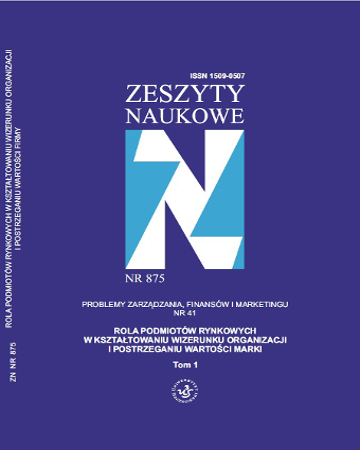
ISSN: 1509-0507
eISSN: 2353-2874
OAI
DOI: 10.18276/pzfm.2015.41/1-21



Issue archive /
ZN 875 PZFiM nr 41 t. 1
Smart marketing w służbie miast
(Smart Marketing for Cities)
| Authors: |
Magdalena
Daszkiewicz
Uniwersytet Ekonomiczny we Wrocławiu |
| Keywords: | smart marketing city branding smart city |
| Data publikacji całości: | 2015 |
| Page range: | 14 (263-276) |
Abstract
The paper presents the theoretical discussion on the possibilities of using "smart idea" in city marketing. Theoretical considerations based on literature studies, enriched with case studies of smart cities are the basis for formulation of a definition of smart marketing, description of the concept and indication of the ways of applying the smart idea in city branding. The use of smart idea in city branding is possible by obtaining strong associations and supporting smart city marketing with unique connotations, arising from the entrenched keys of identification or new, modern identifiers. We should take into consideration the possibilities and limitations associated with the exploitation of smart idea in city marketing in the long term perspective, in the competitive context and communication in the complex environment.
Download file
Article file
Bibliography
| 1. | About Amsterdam marketing, www.iamsterdam.com/en/amsterdam-marketing/about-amsterdam-marketing. |
| 2. | Amsterdam economic board, the city of Amsterdam, Liander and KPN, www.csreurope.org/impact-map/slic/amsterdam-economic-board-city-amsterdam-liander-and-kpn. |
| 3. | Amsterdam pilot city programme , www.worldsmartcapital.net/amsterdam_pilot_city_programme.html. |
| 4. | Amsterdam smart city: „the idea of the smart city will bring us to a new economy”, www.dac.dk/en/dac-cities/sustainable-cities/experts/amsterdam-smart-city-the-idea-of-the-smart-city-will-bring-us-to-a-new-economy. |
| 5. | Amsterdam: Amsterdam Smart City, „City Climate Leadership Awards”, cityclimateleadershipawards.com/amsterdam-amsterdam-smart-city. |
| 6. | Caragliu A., Del Bo C., Nijkamp P., Smart cities in Europe, „Journal of Urban Technology” 2011, Vol. 18, Iss. 2. |
| 7. | Cocchia A., Smart and digital city: a systematic literature review, w: Smart city, red. R.P. Dameri, C. Rosenthal-Sabroux, Progress in IS, Springer International Publishing Switzerland, 2014. |
| 8. | Dameri R.P. Searching for smart city definition: a comprehensive proposal. International, „Journal of Computers & Technology” 2013, Vol. 11, Iss. 5. |
| 9. | Daszkiewicz M., Wrona S., Kreowanie marki korporacyjnej, Difin, Warszawa 2014. |
| 10. | Dieberger A., Frank A.U., A city metaphor to support navigation in complex information spaces, „Journal of Visual Languages & Computing” 1998, Vol. 9, Iss. 6. |
| 11. | Echtner Ch.M., Ritchie J.R.B., The meaning and measurement of destination image, ,,The Journal of Tourism Studies” 2003, Vol. 14, No. 1. |
| 12. | Florek M., Jak dobrze „sprzedać” miasto przyszłości?, w: Przyszłość miast – miasta przyszłości. Raport ThinkTank, Warszawa 2013. |
| 13. | Giffinger R. et al., Smart cities – ranking of european medium-sized cities, research report, Vienna University of Technology, Vienna 2007, http://www.smart-cities.eu/download/smart_cities_final_report.pdf. |
| 14. | Hancke G.P., Silva B.C., Hancke Jr. G.P., The role of advanced sensing in smart cities. „Sensors” 2013, Vol. 13, Iss.1. |
| 15. | Hollands R.G., Will the real smart city please stand up?: Intelligent, progressive or entrepreneurial?, „City: Analysis of UrbanTrend, Culture, Theory, Policy, Action” 2008, Vol. 12, Iss. 3. |
| 16. | Information communication technologies and city marketing: digital opportunities for cities around the world, red. Gascó-Hernández M., Torres-Coronas T., Information Science Reference – Imprint of: IGI PublishingHershey, PA, 2009. |
| 17. | ITS – intelligent transport systems. 8 new intelligent traffic solutions, kk.sites.itera.dk/apps/kk_pub2/pdf/1205_zA7aIS8D1d.pdf. |
| 18. | Kauf S., Smart w logistyce miejskiej jako warunek rozwoju współczesnych miast, „Gospodarka Materiałowa i Logistyka” 2012, nr 2. |
| 19. | Kotler Ph., Haider D., Rein I., Marketing places, The Free Press, New York 1993. |
| 20. | Laker F., Global brands vs global celebs: who's the smarter marketer?, www.slideshare.net/TMTYL/global-brands-vs-global-celebs-whos-the-smarter-marketer. |
| 21. | Make Copenhagen your personal business, „Copenhagen Capacity”, talentcapacity.org/media/1161/talentstrategi_2014.pdf. |
| 22. | Meffert H., Städtemarketing – Pflicht oder Kür?, w: Planung und Analyse 16, H. 8, Jahrgang 1989. |
| 23. | Moilanen T., Rainisto S.K., How to brand nations, cities and destinations, Palgrave Macmillan, New York 2009. |
| 24. | Otgaar A. et al., Empowering metropolitan regions through new forms of cooperation. Ashgate Publishing Limited, Hampshire 2008. |
| 25. | Schaffers H. et al., Smart cities and the future internet: towards cooperation frameworks for open innovation, w: The Future Internet, red. J. Domingue et al., „Lecture Notes in Computer Science” 2011, Vol. 6656. |
| 26. | Smart Society, amsterdamsmartcity.com/projects/theme/label/smart-society?lang=en. |
| 27. | Sznajder A., Technologie mobilne w marketingu, Oficyna Wolters Kluwer business, Warszawa 2014. |
| 28. | Szromnik A., Marketing terytorialny, Oficyna Wolters Kluwer business, Kraków 2007. |
| 29. | Van Bastelaer B., Lobet-Maris C., Social learning regarding multimedia developments at a local level: The case of digital cities, Namur: CITA – University of Namur, 1999. |
| 30. | Wdowiarz-Bilska M., Od miasta naukowego do smart city, „Czasopismo Techniczne. Architektura” 2010, z. 1–A/2. |
| 31. | Why Copenhagen?, www.gladsaxe.copcap.com/content/us/doing_business/why_copenhagen. |